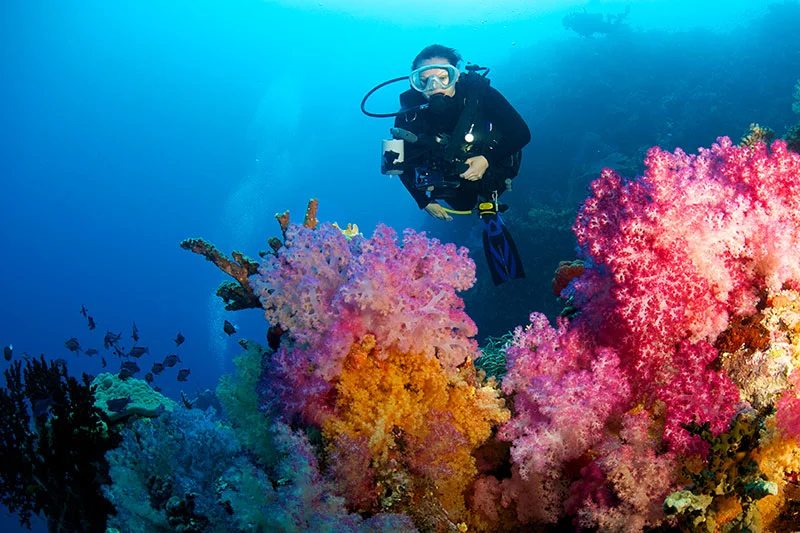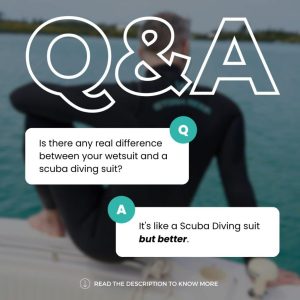
When it comes to recreation activities, Colorado has it all: skiing, hiking, biking, mountain trekking and trail running.
Oh, and don’t forget scuba diving.
Scuba diving in a land-locked state? Yes, you read that right. For a state that prides itself on its purple mountain majesty, you might be surprised to know that the Mile High State has one of the highest numbers of certified scuba divers per capita in the United States.
Chalk these high scuba diving rates up to the typical Colorado resident who is up for adventure and love of all things outdoors, from scaling mountain tops to exploring the ocean floor. And while tackling 14er’s necessitates planning, preparation and precaution, so, too, does scuba diving.
Scuba diving and ear health
What steps can you take to make sure that your tropical vacation doesn’t include a trip to the local ER for scuba-related ear problems? Or even worse, that you end up with an ear problem that is so serious that you need to seek help once you return home?
To answer your questions, we talked with UCHealth ear, nose and throat expert, Dr. Samuel Gubbels, about some do’s and dont’s to keep in mind as you’re packing your swimsuit and sunscreen. In fact, one of the ear, nose and throat physician’s recommendations should even be started in the weeks prior to your vacation to maximize its effectiveness.
Why are ear problems common for some people who scuba dive?
“As a diver descends, and the surrounding pressure increases on the outer ear, the middle ear pressure remains the same. That imbalance is what causes pain. Through equalization, pressure in the middle ear is matched to the pressure outside of the ear as a way to avoid ear damage and pain,” said Gubbels, who is also an associate professor of Otolaryngology and Neurosurgery and medical director of the UCHealth Ear Nose and Throat Clinic at the Anschutz Medical Campus.
Scuba and ear pressure 101: What happens to ears when you scuba dive?
Gubbels describes the basic anatomy of the ear to explain how scuba ascents and descents work. These basics about pressurization also apply to plane rides and car trips up the mountains when you find your ears needing to pop.
The external ear consists of the ear canal and eardrum, the middle ear is a space filled with air, and deeper still are fluid-filled chambers called the cochlea and vestibule. The cochlea and vestibule detect sound and balance information, sending this input to the brain, which enables us to hear and keep our balance.
The main way for our middle ear to “communicate” with the outside world and maintain the same pressure (which helps us retain that equilibrium) is through the eustachian tube, which connects the middle ear to the back of the throat, Gubbels said.
How do ears pressurize?
It’s much easier when you’re flying or driving for people to pressurize or “pop” their ears, Gubbels said. We can yawn, swallow, chew gum or drink something, which opens up the eustachian tube, allowing air flow in and out of the middle ear to help equalize the pressure.
But for scuba divers, it’s a bit more complicated.
The majority of scuba ear injuries happen when that recalibration of pressure in the middle ear doesn’t occur correctly through the eustachian tubes as the pressure inside the middle ear is not balanced with the pressure around the diver.
So how can people scuba dive safely while also keeping their ears healthy? Experts advise divers to relax, not hold your breath and above all, equalize early and often while diving.
According to PADI, the Professional Association of Diving Instructors, and the world’s largest diver organization that annually issues 1 million certificates, techniques include:
- The Valsalva Maneuver: Divers pinch their nose through their mask cover and exhale against their pinched nostrils. It is the most common method taught in diving and regarded as the safest one.
- The Lowry Technique: While pinching their nostrils, divers simultaneously exhale and swallow.
- The Edmonds Technique: Basically, the Valsalva Maneuver but it also involves pushing your jaw forward.
Gubbels said if your ears hurt while you’re attempting these maneuvers, you’re probably diving too deep, so ascend a few feet and try again.
Do I need to be careful about scuba diving if I have a cold or sinus infection?
In general, it’s a bad idea to scuba dive while you’re sick or have an infection, Gubbels said. Any congestion you have on the surface is going to complicate equalization the further you go underwater.
“It’s not a good call to dive while you’re sick,” he said. “If you have an ear infection or if your eustachian tubes are already irritated due to an upper respiratory infection or a flare of nasal allergies, you’re heading into a situation where your ears are going to be challenged, and there is an increased likelihood the pressure is going to make equalization more problematic, causing pain”
Should I avoid scuba diving if I suffer from chronic allergies?
It depends. Those afflicted with allergies may find diving difficult, he said, as it’s a “mechanical problem” with the eustachian tubes being filled and swollen shut to varying degrees on a regular basis.
If you’re determined to dive, he suggests working with a primary care physician or an ear, nose and throat specialist to pre-treat your condition with a nasal steroid sprayed in the lining of the nose in the weeks leading up to your vacation.
Can I wear ear plugs while diving?
In general, people can’t wear ear plugs while diving, Gubbels said. Standard earplugs create an air space that cannot be equalized while descending. While some manufactures have touted “vented plugs” to help maintain proper pressure, it is questionable on how well they work.
I just re-surfaced after scuba diving, and I have ear pain. What should I do?
Gubbels advises divers to seek help right away.
“Talk to your local dive instructor,” Gubbels said. “If you’ve used a reputable outfit, which you definitely should, they will be experienced and know where you can get help, or they can provide over-the-counter remedies such as oral decongestants and nasal sprays that should give you some relief.”
If you’re dizzy or experiencing vertigo or significant changes in hearing, then you need to seek urgent care.
What is a ruptured eardrum?
A ruptured or perforated eardrum is a tear in the membrane that separates the middle ear from the outer ear. It can occur when a diver descends too quickly and doesn’t equalize pressure properly. Scuba divers can be more at risk for this if they are experiencing congestion, a cold, or haven’t been properly trained.
While most perforated eardrums heal on their own within a month or so, local medical personnel may prescribe antibiotics to prevent infection, as well as pain medication for a more comfortable plane ride home. If several months have passed and the ear has not improved, surgery is an option, Gubbels said.
What is barotrauma?
Barotrauma is the feeling you get after ear pressure changes and you have pain in your ear or a sense that your ear is clogged. Severe barotrauma can cause a ruptured eardrum, bleeding or leaking from the ear, dizziness, or a buzzing sound, and can lead to hearing loss.
“We do see those who are still having problems once they come home who have ruptured ear drums that are still bothering them. Most of the time, these heal on their own but on occasion, we will need to go in and do some repair work on the ear.”
I’m back from vacation, and my ears still hurt. What should I do now? Is it time to see a doctor?
“It can get a little complicated,” he said, “As some of the symptoms people might have such as dizziness or hearing issues can overlap with other medical problems. Inner ear-related hearing loss, dizziness or spinning after diving could be a signal a problem with lasting effects and should be evaluated medically, as there are a variety of treatment methods, from oral steroids to hyperbaric treatments to physical therapy to surgery.
“Scuba diving is very popular with Colorado residents, but you’d be ill-advised and foolhardy to do it on your own. Make sure you have the proper training with a PADI-certified program that is robust and rigorous, as that will help minimize risks.”



